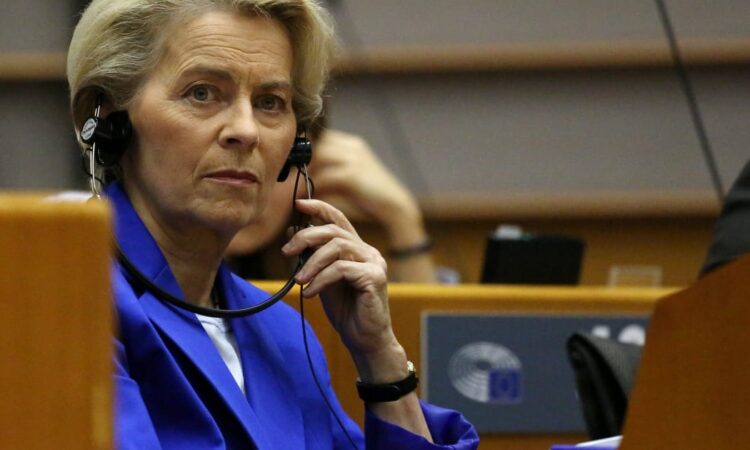
European Commission President Ursula von der Leyen has fired the starting gun on a debate likely to divide the European Union — whether new EU funding is needed to help bolster the bloc’s industrial base.
Having been caught off guard by new U.S. legislation that benefits North American businesses at the expense of Europe, the EU has been searching for ways to help boost its competitive edge.
On Sunday, the Commission chief gave her first substantive response to the U.S. Inflation Reduction Act, the climate legislation from President Joe Biden’s administration that has enraged Brussels over provisions deemed protectionist, particularly regarding electric vehicles.
In addition to pledging a redesign of the bloc’s state-aid rules to encourage local investment in clean tech, von der Leyen also called for “new and additional funding at the EU level.”
This involves “greater firepower” for REPowerEU, the EU’s plan to wean the bloc off its dependency on Russian gas, she said. But von der Leyen also called for “new and additional funding at the EU level,” pointing to a new European Sovereignty Fund first mentioned in her State of the Union address to the European Parliament in September.
“A common European industrial policy requires common European funding,” she told an audience in Bruges. “The goal of our European industrial policy is for European industry to be the leaders in the clean transition. This means over the mid-term, beefing up the resources available for upstream research, innovation and strategic projects at the EU level.”
The call for a fresh influx of EU funding recalls the debate that led up to the establishment of the COVID recovery fund, which was ultimately financed through joint borrowing. If that debate was any guide, the upcoming talks promise to be contentious.
While Commission officials insisted no concrete proposal is imminent and that discussions were only beginning with member countries, the issue could be on the agenda of next week’s EU leaders meeting in Brussels.
Many member countries, including Germany, are dead set against issuing new EU money. Instead, they favor tapping existing programs like NextGeneration EU and RenewEU for cash. And Berlin is far from alone.
“There is still unused money in the pot — not to mention loans that have not been tapped,” said one EU official from a fiscally prudent member country. “The last thing the EU wants is to open up a debate about more EU funds.”
A diplomat from another country told POLITICO’s Brussels Playbook: “We need to be clear which sectors will really be hit by the IRA and to what extent. Based on that, we can make an assessment of where support is necessary,” but added: “Why start a very difficult discussion about new funds now if we can look at how to better tap what’s already available?”






